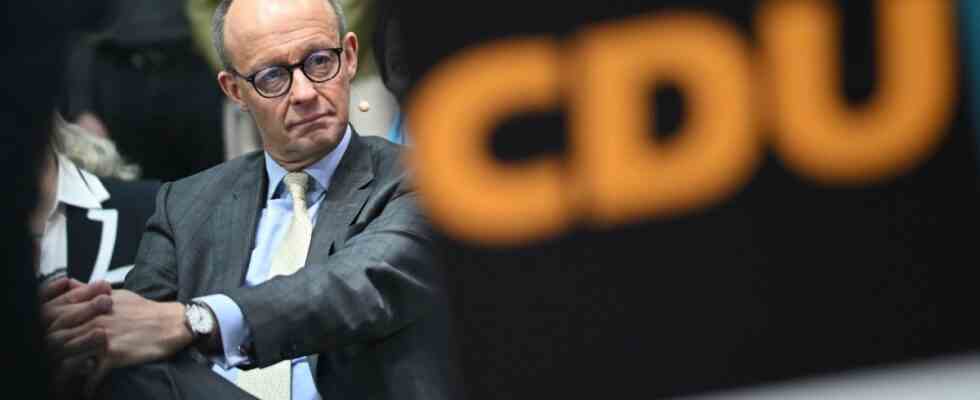In recent decades, it has not often happened that the capital’s CDU has made its federal party happy. The Berlin Christian Democrats have developed considerable skills to stumble even from good starting positions. But this time the capital’s Christian Democrats did it differently. They were able to significantly improve their results. And they managed to become the strongest party by a wide margin. In the last election, the CDU came third, behind the SPD and the Greens. The year 2023 has started well for the German Christian Democrats – unlike 2022. At that time they had lost the Saarland election with a bang. The Union should welcome the great impetus from Berlin: the state elections in Bremen are on the agenda for May. In autumn, the state parliaments in Bavaria and Hesse will also be redefined.
The Berlin CDU “did a really good election campaign with Kai Wegner at the helm, with good new ideas, with funny and catchy campaign slogans,” says Friedrich Merz. However, the truth should also be that many Berliners not only voted for the CDU out of enthusiasm, but also because they found the red-green-red Senate even more daunting. And that the CDU could have done even better if it had competed with more convincing personnel. According to a survey by the opinion research institute Forsa from last week, despite the great dissatisfaction with the red-green-red Senate, only 29 percent of Berlin’s eligible voters believed that a Senate led by the CDU would govern the city better.
In Berlin, the problems that the federal CDU has on a large scale are showing up on a small scale: The Union is only partially convincing on its own, above all it benefits from dissatisfaction with the government. Friedrich Merz is just as little a gifted human catcher as Kai Wegner. And above all: the Union is in first place in the nationwide polls, but it would have difficulty finding coalition partners after a federal election. And without a coalition partner, it has no prospect of power.
Kühnert gives the CDU little hope
On Sunday evening, CDU General Secretary Mario Czaja referred to the growth of Berlin’s Christian Democrats, who were now far ahead of the SPD and the Greens. This results in a clear government mandate for his party. Shortly afterwards, his colleague from the SPD, Kevin Kühnert, made it clear that it would not be that easy. The Berlin CDU did not campaign with outstretched hands, but closed many doors, says Kühnert. And points out that it is now not important who is in first place, but who brings together a majority.
Merz and Wegner want to perform together this Monday at 1:30 p.m. in the Konrad-Adenauer-Haus. They will then celebrate the election result – also with a view to the next state elections.
Chancellor Olaf Scholz’s traffic light coalition could now face turbulent times. “Of course it hurts,” said SPD general secretary Kühnert on Sunday evening. “This is not the result that the SPD wanted.” Especially since one coalition partner, the Greens, now comes out of the election evening on an equal footing with the Social Democrats. In any case, Greens boss Ricarda Lang sees the result “as a mandate in terms of affordable housing and climate protection”. Ultimately, what is decisive is what can be implemented with whom.
The Greens are gaining self-confidence
The Greens gained self-confidence that evening. They will not let themselves be sniffed out with the Union either – if only to drive up the price for other coalitions. “Of course” her party is willing to hold talks with the CDU, says Emily Büning, the political director of the Greens. But she also reiterates that her preference is to continue the previous coalition with the SPD and the left.
The renewed nail-biter of the FDP should not go unnoticed by the federal government. The Union wins votes, the FDP loses them – that should encourage the liberals to sharpen their conservative profile. Many in the coalition still have painful memories of what that can mean. In October last year, before the state elections in Lower Saxony, the dispute over nuclear power within the traffic light seemed to have been largely settled. But after the election, the FDP was in a quarrelsome mood, having narrowly missed the five percent hurdle. In the end, the chancellor had to use his policy competence to settle the nuclear dispute.
Is the FDP result in Berlin now threatening a tougher pace for the liberals in the federal government? “The voice of the FDP must become even clearer within the coalition,” says General Secretary Bijan Djir-Sarai. There is plenty of potential for disputes in the coalition, just about FDP plans to accelerate motorway construction or about green demands for climate protection. Paradoxically, it is clear to everyone at the traffic light where endless arguments lead: Most of the time, everyone involved loses.

